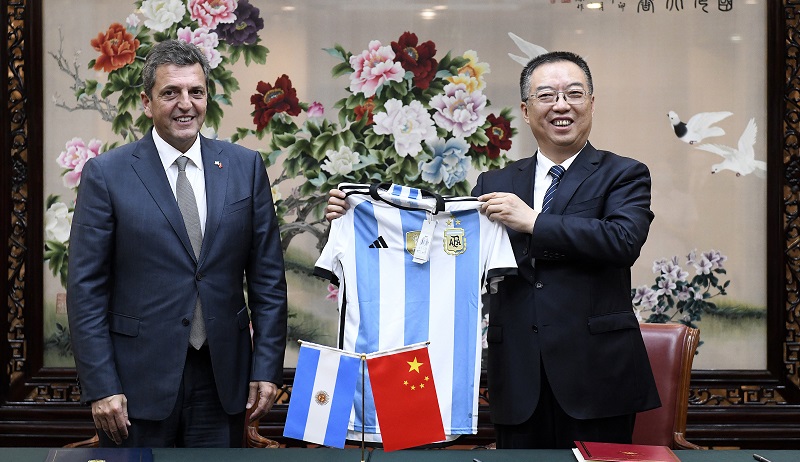
Fundamental leader of the Chinese state bureaucracy, Deng Xiaoping popularized that phrase that read “it doesn’t matter if the cat is white or black, what matters is that it catches mice”. concept summit of pragmatismthe definition complemented the fierce transformations that China was undergoing in its growing and dizzying reinsertion into world capitalism, which occurred over several decades, culminating in neoliberal times.
that same pragmatism runs through the veins of the ruling Peronism. It has nothing recent, as we said a few weeks ago. At this time, begging a few million yuan in the Far East, he chooses courtesy towards the economic powerhouse that has its capital in Beijing. Thus, the relationship with China is presented as of a “collaborative nature”, devoid of any “type of pressure”. Along the same lines, the Asian country is accused of promoting “principles of cooperation, respect and mutual benefit” on a global scale.
Kirchner’s praise for the State led by the PCCH choose to circumvent the repressive brutality of that regimeclosely linked to the creation of a gigantic army of cheap labor on an international scale. The “Chinese miracle” of the last decades is inherent in a state policy aimed at regulating the labor conditions of the working class in order to lower the “labor cost” of the large imperialist multinationals and, logically, of the rising Chinese bourgeoisie.
This discursive adulation of the ruling Peronism finds its root, first of all, in the complex situation of the national economy. Domestic conditions push to pass the cap in Beijing and Shanghai. He yuan it shines brighter the more it counterbalances the dramatic lack of dollars at the Central Bank led by Miguel Pesce.
The praises are also nourished by the Tensions running through the geopolitical scene international. In a world where US hegemony tolerates criticism and questioning, dependent countries are playing to exploit disputes between great powers. Political maneuvering accompanies a widely circulated political discourse, which seeks to present to China as a pivot of a new world order, of multipolar character. a luck of internationalist malmenorismwhich chooses to celebrate the supposed Eastern “dialogue” against the harshness governed by the US imperialist power.
But behind the kindness of the phrases and the smiles for the photo, the harshness of the material interests. In tense economic dispute with the US, China works to access greater influence in Latin American territory. Its economic weight has not stopped growing in the last decade. Its financial capacity gave it a place of power in a region that inhabits -increasingly- a “double dependency”, tied to the crossed pressures of the North American power and the country led totally by Xi Jinping.
Faced with this pressure, Argentina governed by the Front of All offers -it could not be otherwise- greater economic subordination. encouraging the paths of extractivismpresents itself to the Chinese power as a huge lithium saltopen to be exploited.
Now, after the currency swap renewal, the hope of Massa and Kirchnerism continues on its way to August. That month the Board of Directors of the New Development Bank – colloquially known as the “BRICS bank” – will meet and discuss the eventual -and probable- incorporation of Argentina.
For now, that ad has the value of a political gesture. Not only towards the interior of the Argentine borders, as an endorsement to the minister of the highest inflation in three decades and pro-government candidate “on hold”. Also towards the global north; towards the power that is formally based in Washington. That’s where Sergio Massa will leave -in hours-, that true friend of the US Embassy who seemed forced to overact sympathy in Beijing and Shanghai.
Cardboard “Republicans”
He extractivist consensus It is not exclusive to the Frente de Todos. On the contrary, it runs through the set of capitalist political coalitions. One of his most seasoned spokesmen is Jujuy Gerardo Morales.
At this time, the right-wing governor is pushing an undemocratic constitutional reform in that province. Trying to sweep the right to social protestadvances even further, to the point of questioning the same right to vote, amplifying the parliamentary mandates to four years, reducing the interference of the population in the election of legislators and legislators. A kind of institutional coup that pushes a totalitarian provincial regime. A cardboard “republicanism”, defender of an institutionality built to deny the will of the peoplealready deeply limited in this capitalist democracy.
That totalitarian laboratory is closely linked to an economic project whose winners are, among others, the big mining companies and the multinationals that they exploit lithium or intend to exploit it, at the cost of a deeper degradation of the environment.
#NoALaReforma
Day 5 | Economy Commission | Jujuy Water Code
Representatives of the mining chamber, of tobacco, of sugar, owners of the province, and of those who appropriate this natural common good of all.Present realizing the looting and defense of water ✊🏽💧 pic.twitter.com/8J5cuGMjpb
— Natalia Morales (@NatuchaMorales) May 30, 2023
Challenging the right to protest is not reduced, however, to a guarantee of mining businesses. Nor is it limited to the province governed by radicalism. This is clearly evidenced by the “anti-picket law” that the Salta Senate voted this Thursday, at the request of the massist Gustavo Saénzactive repressor of the teacher protest in that province.
And political-ideological climate On the contrary, the right to claim has permeated the national scene for a long time: it is born and fed by pro-government and opposition factories. His most rabid cry is heard among the hosts of so-called “libertarians.” He has promoters, however, in Together for Change and the Front of All. This discourse appears as structural necessity of the ruling class. As reinsurance against undoubted resistance that broad sectors of the working class, youth and poor people will deploy in the face of new leaps in the adjustment offensive and in the repression itself.
The management of decay
Politically, the week that ends started far from Argentina. Crossing the Atlantic, the broad electoral triumph of the Spanish right rocked the local scene. Saturating screens and social networks, the Argentinian media right chose to link the experiences of the Spanish PSOE and We can with the Kirchnerism that inhabits these lands.
Analyzing this result, an interesting article published by the journalist Emmanuel Rodriguez describes the involution of the left that represented We can. The text accounts for the decline of a left that assumed as its own capitalism state administration while resigned all political intention of social transformation.
That left -reviews the author- came to power as an expression of the passivation of the mass mobilization process that emerged in the “Outraged” 2011. Assuming that strategic resignation to capitalisminevitably that “left became the main guarantor that all politics (of protest, indignation, etc.) were nothing more than electoral-parliamentary politics”.
There is an obvious similarity with what happened in the Argentina after 2001. The discursive and political affinities between We can and Kirchnerism express a same political-social function: currents that emerged to life channeling street social discontent towards a “Palacio policy”. This company meant deactivating all the elements of a politics from belowmade in the interest of the structural transformation of the existing order.
In the heyday of the early years of this century, that policy existed as germ; as bet. Its first limit lay in the fragile consistency of its social subject. This was essentially a the popular sea that exuded fury in the streets, unable to organize itself around a social center with the power to challenge capitalist power. The working class, diluted in the collective anger, did not act with its own methods. Those methods that, in the France recently, they showed the strength to shake Macron and his pension reform.
Exemplifying the tensions and contradictions that plague politics and life, Kirchnerism emerged as continuation and at the same time denial of that convulsive process that devastated the national streets. That operation was inscribed within logic: recycling figures, mutating stories, the new political current sprouted from the heart of the peronism. expressed the historic strategy that defines that movement: the containment of discontent for the restoration of order.
Logically, the Politics as a promise of social transformation relinquished or was displaced by politics as administration of the -increasingly decadent- Argentine capitalist state. He current malmenorismwhich leads to active support for Massa’s adjustment, is the closest sequel to that definition.
The decades that have passed, in their multiple undulations, have evidenced the decline of Argentine capitalism. He stateeven in its anti-neoliberal discursive version, patented its growing inability to attend to popular emergencies. In that frustration she found roots antipolitics that runs through neighborhoods and cities. “Populists” and “Republicans” functioned as permanent guarantors of backwardness and national dependence. If the rhetorical trappings, polemical exaggerations and programmatic nuances are stripped away, a common matrix. Bowing before the great capital -native and imperialist-, the bosses’ political forces perpetuated an economic scheme tied to the primarization of the economy and external indebtedness. That inclination is discovered today in the agreement with the IMF. Born in Macrista years and continued in the cycle of the Frente de Todos with the endorsement -tacit and explicit- of all its wings, it pushes the country to further decline, evidenced in the dramatic situation of millions of working and poor families.
In a world shaken by geopolitical tensions and economic, there is no way out of that decline within the limited frameworks of dependent national capitalism. Without facing that decline, the options for the local ruling class seem limited to passing the cap in Shanghai or begging in Washington.
Source: www.laizquierdadiario.com

